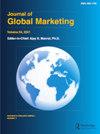人的价值观与生活满意度:文化与年龄的调节效应
IF 4.3
Q1 Business, Management and Accounting
引用次数: 5
摘要
已有文献表明,人的价值观会影响消费者的产品偏好,进而影响他们的选择。本文旨在利用2010-2014年世界价值调查(WVS)第6波数据,调查人类价值观与消费者群体整体生活满意度之间的关系,该数据包括居住在全球56个国家的85512名受访者。利用现有的详细社会人口统计数据,对一系列有序逻辑模型进行了估计。研究结果表明,人的价值观和整体生活满意度之间存在显著关系。有趣的是,这些关系受到文化区域和年龄的调节。研究结果不仅支持文化层面价值观的概念,而且表明理性的个体会随着年龄的增长而动态地改变他们的价值重点,以确保更高水平的整体生活满意度。因此,全球营销人员应将其产品的优惠和促销活动与其目标市场寻求的价值观动态调整。还讨论了对居住在不同文化区域和属于不同年龄组的消费者进行营销的其他影响。本文章由计算机程序翻译,如有差异,请以英文原文为准。
Human Values and Life Satisfaction: Moderating Effects of Culture and Age
Abstract Extant literatures have illustrated that human values influence consumers’ product preference and subsequently their choices. This article aims to investigate the relationship between human values and overall life satisfaction across consumer segments using the 2010–2014 World Value Survey (WVS) wave 6 data, which comprises of 85,512 respondents residing in 56 countries around the world. With available detailed socio-demographic data, a series of ordinal logistic models are estimated. Results show significant relationships between human values and overall level of life satisfaction. Interestingly, these relationships are moderated both cultural regions and age. Findings do not only support the notion of cultural-level values, but also suggest that rational individuals dynamically shift their value priorities as they age to ensure a higher level of overall life satisfaction. Consequently, global marketers should dynamically align their product offering’s benefits and promotions with the values that its target market seeks. Other implications for marketing to consumers residing in different cultural regions and belonging to different age groups are also discussed.
求助全文
通过发布文献求助,成功后即可免费获取论文全文。
去求助
来源期刊

Journal of Global Marketing
Business, Management and Accounting-Business and International Management
CiteScore
6.80
自引率
0.00%
发文量
10
期刊介绍:
Stay current on cross-cultural marketing at both micro and macro levels! The Journal of Global Marketing is the top-notch journal packed with the latest global marketing planning and programming strategies, current information, and contemporary research findings on marketing challenges and opportunities that firms, industries, and public sector agencies encounter worldwide. The expert contributors to the journal include leading marketing and international business scholars, practitioners, and policymakers who provide up-to-date practical information vital for management and administrative professionals.
 求助内容:
求助内容: 应助结果提醒方式:
应助结果提醒方式:


